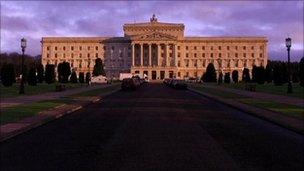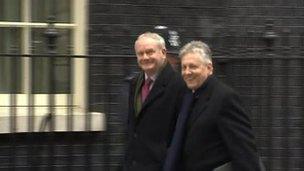Corporation tax move 'tough blow' for Stormont
- Published
- comments

The five main Stormont parties and business lobbyists had been hoping for a decision on corporation tax
So what was it all about?
The walkabout by George Osborne at Wrightbus in Ballymena?
The appearance by the exchequer secretary, David Gauke, at the launch of a public consultation at the Kelvatek electronic plant at Lisburn?
The countless interviews with former Secretary of State Owen Paterson extolling a corporation tax cut as a potential way of rebalancing Northern Ireland's public sector dominated economy?
After marching Northern Ireland's business community up the hill, David Cameron's government has now left Stormont back virtually where it was when Gordon Brown occupied Number Ten.
Then, after a similar period of enthusiasm, the retired treasury mandarin, Sir David Varney, gave the proposed initiative a thumbs down.
On a visit to Edinburgh, Peter Robinson and Martin McGuinness tried to convince Alex Salmond not to spoil their pitch for devolving business taxes.
However, as soon as Scottish politicians expressed their interest in getting the power, the Treasury was always going do its sums - bearing in mind what any change might mean, not just for Northern Ireland, but also for the potential loss of Scotland's more lucrative business tax yield.

The executive would have to compensate the Treasury for any reduction in corporation tax
David Gauke said devolving the power to Edinburgh would raise the prospect of "substantial practical profit shifting issues".
By postponing any decision until after the Scottish independence referendum, the London government has opened itself up to renewed criticism from the SNP that the only way for Scotland to get wider powers is for voters to opt for full independence.
London ministers appear to be banking - on the basis of the opinion polls - on a Scottish "no" vote.
David Cameron has said that after such a result, London would be flexible about extending extra powers to Edinburgh.
But the prime minister, it seems, would rather get into the nitty gritty of corporation tax after the Scottish poll, than create a precedent beforehand.
Some may welcome Downing Street's decision to pour cold water on the corporation tax campaign.
The trade unions and the North Down MP, Lady Sylvia Hermon, worried about the potential cost to public services.
The TUV leader, Jim Allister, reckoned trying to match the Irish Republic's 12.5% rate was "chasing a moonbeam".
But for the five main Stormont parties and the business lobbyists who had been building up their hopes in recent days this is a tough blow.
They'd hoped corporation tax might prove a "game changer" - now they are going to have to go back to playing their same, old game.